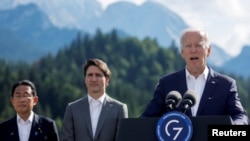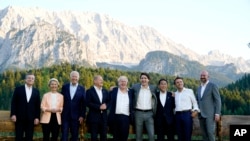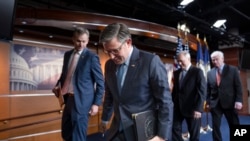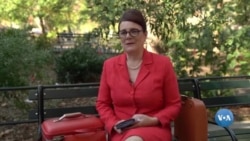ປະທານາທິບໍດີຂອງສະຫະລັດ ທ່ານໂຈ ໄບເດັນ ເຂົ້າຮ່ວມກອງປະຊຸມສຸດຍອດຂອງກຸ່ມ 7 ປະເທດເສລີນິຍົມ, ປະຊາທິປະໄຕທີ່ຮັ່ງມີໃນຊ່ວງເວລາທີ່ຍາກລໍາບາກ, ດ້ວຍສົງຄາມຢູ່ໃນຢູເຄຣນ ທີ່ບໍ່ມີຮ່ອງຮອຍ ສະແດງໃຫ້ເຫັນວ່າຈະຍຸຕິລົງ ແລະຄວາມທະເຍີທະຍານຂອງຈີນ ທີ່ແຜ່ຂະຫຍາຍອິດທິພົນໄປທົ່ວໂລກ. ທໍານຽບຂາວກ່າວວ່າ ພວກເຂົາເຈົ້າໄດ້ມີຄວາມມຸ້ງໝັ້ນທີ່ຈະຮັບມືກັບບັນ ຫາເຫຼົ່ານີ້ ດ້ວຍເຄື່ອງມືຕ່າງໆເຊັ່ນ ໃຊ້ຈໍານວນເງິນ 600 ຕື້ໂດລາ ສຳລັບພື້ນ ຖານໂຄງລ່າງທີ່ຖືກມອງວ່າ ເປັນການໂຕ້ຕອບຕໍ່ໂຄງການລິເລີ້ມ ນຶ່ງແລວທາງນຶ່ງເສັ້ນທາງຂອງຈີນ. ນັກຂ່າວ VOA ປະຈໍາທໍານຽບຂາວ ແອນນິຕາ ພາວ (Anita Powell) ລາຍງານຈາກເມືອງເທລຟ໌ (Telfs), ປະເທດອອສເຕຣຍ, ເຊິ່ງ ທິບສຸດາ ມີລາຍລະອຽດມາສະເໜີທ່ານໃນອັນດັບຕໍ່ໄປ.
ບັນດາປະເທດເສລີນິຍົມປະຊາທິປະໄຕທີ່ຮັ່ງມີທີ່ສຸດໃນໂລກ ມີຫຼາຍເລື້ອງທີ່ຈະຕ້ອງໄດ້ເວົ້າເຖິງ ໃນລະຫວ່າງທີ່ພວກເຂົາເຈົ້າ ພົບປະກັນ ຢູ່ທີ່ກອງປະຊຸມສຸດຍອດຂອງກຸ່ມ G-7 ໃນປະເທດເຢຍຣະມັນ.
ຄວາມທ້າທາຍທີ່ໃກ້ທີ່ສຸດແມ່ນຢູ່ຫ່າງຈາກກອງປະຊຸມບໍ່ເຖິງ 1,500 ກິໂລແມັດ, ທີ່ນະຄອນຫຼວງກີຢິບ ຂອງປະເທດຢູເຄຣນ ກໍາລັງຢູ່ພາຍໃຕ້ການໂຈມຕີຄັ້ງໃໝ່ຂອງຣັດເຊຍ ໃນຊ່ວງທ້າຍອາທິດທີ່ຜ່ານມາ.
ເຈົ້າພາບ ຈັດການປະຊຸມສຸດຍອດໃນຄັ້ງນີ້ ນາຍົກລັດຖະມົນຕີຂອງເຢຍຣະມັນ ທ່ານໂອລາຟ ໂຊລສ໌ (Olaf Scholz) ກ່າວວ່າ ຄວາມໝັ້ນຄົງຂອງ ຢູເຄຣນ ແມ່ນບູລິມະສິດ ສໍາຄັນທີ່ສຸດ. ປະທານາທິບໍດີຂອງຢູເຄຣນ ທ່ານໂວໂລດີເມຍ ເຊເລັນສກີ ພົບປະກັບບັນດາຜູ້ນໍາຂອງປະເທດຕ່າງໆເຫຼົ່ານີ້ທາງອອນລາຍໃນມື້ວັນຈັນວານນີ້.
ທ່ານໂອລາຟ ໂຊລສ໌, ນາຍົກລັດຖະມົນຕີຂອງປະເທດເຢຍຣະມັນ ກ່າວວ່າ:
“ເຢຍຣະມັນ ແລະສະຫະລັດ ຈະປະຕິບັດງານຮ່ວມກັນຢູ່ຕະຫຼອດເວລາ ເມື່ອມີຄໍາຖາມຕ່າງໆກ່ຽວກັບຄວາມໝັ້ນຄົງຂອງຢູເຄຣນ, ແລະພວກເຮົາຈະເປີດເຜີຍລາຍລະອຽດ ກ່ຽວກັບເລື້ອງນີ້ອີກຄັ້ງນຶ່ງ.”
ກຸ່ມດັ່ງກ່າວ ໄດ້ກ່າວໃນມື້ວັນອາທິດແລ້ວນີ້ວ່າ ພວກເຂົາເຈົ້າຍັງຈະສືບຕໍ່ບີບບັງ ຄັບການເຮັດສົງຄາມຂອງຣັດເຊຍໂດຍໂຈະການນໍາເຂົ້າຄໍາຈາກປະເທດດັ່ງກ່າວບວກກັບການລົງໂທດທາງດ້ານນໍ້າມັນ, ເຄື່ອງອຸປະໂພກບໍລິໂພກ, ດ້ານທະນາ ຄານ ແລະບັນດາບຸກຄົນທີ່ສຳຄັນໆຂອງຣັດເຊຍ.
ແຕ່ນອກນັ້ນ ພວກຜູ້ນຳຍັງມີຄວາມເປັນຫ່ວງກ່ຽວກັບການທ້າທາຍຈາກຈີນ.
ໃນວັນອາທິດທີ່ຜ່ານມານີ້ ພວກເຂົາເຈົ້າໄດ້ປະກາດຂໍ້ລິເລີ້ມພື້ນຖານໂຄງລ່າງມູນຄ່າ 600 ຕື້ໂດລາທີ່ໄດ້ປາກົດຕົວໃຫ້ເຫັນໃນກອງປະຊຸມສຸດຍອດກຸ່ມຈີ-7 ເທື່ອແລ້ວ ທີ່ແນໃສ່ເພື່ອໃຫ້ທາງເລືອກ ແກ່ບັນດາປະເທດທີ່ກຳລັງພັດທະນາຕໍ່ຂໍ້ລິເລີ້ມນຶ່ງແລວທາງນຶ່ງເສັ້ນທາງຂອງຈີນ.
ທ່ານໂຈ ໄບເດັນ, ປະທານາທິບໍດີຂອງສະຫະລັດ ກ່າວວ່າ:
“ຂ້າພະເຈົ້າຕ້ອງການສະແດງໃຫ້ເຫັນຢ່າງແຈ່ມແຈ້ງວ່າ ນີ້ບໍ່ແມ່ນການຊ່ວຍເຫຼືອ ລ້າຫຼືການກຸສົນ, ນີ້ແມ່ນການລົງທຶນ ທີ່ຈະນໍາຜົນຕອບແທນກັບຄືນມາໃຫ້ແກ່ທຸກໆຄົນ ລວມທັງປະຊາຊົນຊາວອາເມຣິກັນ ແລະປະຊາຊົນຂອງໝົດທຸກປະເທດພວກເຮົາ. ມັນຈະຊຸກຍູ້ລະບົບເສດຖະກິດຕ່າງໆຂອງພວກເຮົາ, ແລະມັນກໍເປັນໂອກາດຂອງພວກເຮົາໃນການແບ່ງປັນວິໄສທັດຂອງພວກເຮົາໃນທາງບວກສຳລັບອະນາຄົດ, ພ້ອມທັງເຮັດໃຫ້ຊຸມຊົນຕ່າງໆຢູ່ໃນທົ່ວໂລກໄດ້ເຫັນຕົນເອງ ແລະເຫັນຜົນປະໂຫຍດທີ່ເຂັ້ມແຂງຂອງການເປັນພາຄີກັບບັນດາປະເທດປະຊາທິປະໄຕດ້ວຍໂຕຂອງພວກເຂົາເອງ.”
ບັນດານັກວິເຄາະກ່ຽວກັບຈີນກ່າວວ່າ ກຸ່ມ G-7 ກໍາລັງປະເຊີນກັບການແຂ່ງ ຂັນທີ່ເຂັ້ມງວດ ຈາກໂຄງການລິເລີ້ມນຶ່ງແລວທາງນຶ່ງເສັ້ນທາງ.
ທ່ານໂຣເບີດ ດາລີ (Robert Daly), ຜູ້ອໍານວຍການ ສະຖາບັນຄິສຊິງເຈີ(Kissinger) ກ່ຽວກັບ ຈີນ ແລະສະຫະລັດ ແຫ່ງສູນກາງວູດໂດຣວວີລສັນ ກ່າວຜ່ານທາງຊູມວ່າ:
“ບໍ່ພຽງແຕ່ສະຫະລັດ ແລະ ຢູໂຣບ ເທົ່ານັ້ນ, ແຕ່ ຍີ່ປຸ່ນ, ອອສເຕຣເລຍ ແມ່ນພາກັນກັງວົນກ່ຽວກັບບັນຫາດັ່ງກ່າວນີ້, ແລະພວກເຂົາເຈົ້າທັງໝົດກໍາລັງພະຍາ ຍາມນໍາສະເໜີທາງເລືອກ ໄປໃຫ້ປະເທດຜູ້ກູ້ຢືມຕ່າງໆເຫຼົ່ານັ້ນບໍ່ຕ້ອງໄປຫາຈີນ ‘ຂໍການຊ່ວຍເຫຼືອ’ ເພື່ອໃຫ້ໄດ້ຮັບເງິນກູ້ຢືມ, ແຕ່ສາມາດມາຫາອົງການໃໝ່ເຫຼົ່ານີ້ໄດ້ເຊັ່ນດຽວກັນ. ບັນຫາກໍຄືວ່າ ອົງການໃໝ່ເຫຼົ່ານີ້ແມ່ນຊ້າ, ພວກເຂົາເຈົ້າຫຍຸ້ງຍາກທາງການເມືອງ, ພວກເຂົາເຈົ້າບໍ່ມີເງິນຫຼາຍຢູ່ໃນທະນາຄານ, ພວກເຂົາເຈົ້າບໍ່ເຄື່ອນໄຫວຜ່ານປະຕູໄດ້, ພວກເຂົາເຈົ້າບໍ່ສາມາດແຂ່ງຂັນດ້ວຍເງິນທຶນທີ່ຈີນຈັດສັນໃຫ້ຢ່າງໄວວາໄດ້ ໂດຍຜ່ານໂຄງການນຶ່ງແລວທາງນຶ່ງເສັ້ນທາງຂອງຈີນ. ແລະໂດຍຜ່ານການຈັດຫາເງິນເຫຼົ່ານັ້ນ, ຈີນສາມາດຄ່ອຍໆສ້າງຄວາມເຄົາລົບ ໂດຍຜ່ານການເພິ່ງພາອາໄສ.”
ກຸ່ມ G-7 ຍັງໄດ້ເພີ່ມບ່ອນນັ່ງຈໍານວນນຶ່ງເຂົ້າໃນໂຕະ ໂດຍການເຊີນບັນດາຜູ້ ນໍາຂອງ ອາຟຣິກາໃຕ້ ແລະ ອິນເດຍ ເຂົ້າຮ່ວມກອງປະຊຸມບາງຢ່າງທີ່ໄດ້ຈັດຂຶ້ນຢູ່ໃນ ບາວາຣຽນ ອາລປ໌ສ (Bavarian Alps).
ສອງປະເທດຫຼ້າສຸດ ທີ່ຫາກໍເຂົາຮ່ວມກອງປະຊຸມສຸດຍອດຂອງກຸ່ມ BRICS ທາງອອນລາຍເມື່ອໄວໆມານີ້ ເຊິ່ງເປັນກຸ່ມຂອງປະເທດທີ່ປະກອບດ້ວຍ ບຣາຊີລ, ຣັດເຊຍ, ອິນເດຍ, ຈີນ ແລະອາຟຣິກາໃຕ້, ໂດຍປະທານປະເທດຂອງຈີນ ທ່ານສີ ຈິ້ນຜິງ ໄດ້ກ່າວຕ້ອງຕິ ຕໍ່ຄວາມພະຍາຍາມຂອງບັນດາປະເທດປະຊາທິປະໄຕຕາເວັນຕົກໃນການສ້າງຄວາມໂດດດ່ຽວໃຫ້ແກ່ເສດຖະກິດຂອງ ຣັດເຊຍ.
ທ່ານສີ ຈິ້ນຜິງ, ປະທານປະເທດຂອງຈີນ ກ່າວວ່າ:
“ການໃຊ້ເສດຖະກິດໂລກເພື່ອຜົນປະໂຫຍດທາງການເມືອງ, ເປັນເຄື່ອງມືແລະ ເປັນອາວຸດ, ແລະມີເຈດຕະນາກໍານົດມາດຕະຖານການລົງໂທດ ໂດຍສວຍໃຊ້ປະໂຫຍດຈາກສະຖານະພາບ ທີ່ເປັນຜູ້ຄອບງຳ ໃນດ້ານການເງິນລະຫວ່າງປະ ເທດ, ແລະລະບົບການເງິນຕ່າງໆ ຈະລົງທ້າຍດ້ວຍການທໍາລາຍຜົນປະໂຫຍດຂອງຕົນເອງ ເຊັ່ນດຽວກັບຜົນປະໂຫຍດຂອງຜູ້ອື່ນໆຫຼາຍຄົນ, ພ້ອມທັງ ສ້າງຄວາມທຸກທໍລະມານ ໃຫ້ກັບທຸກໆຄົນຢູ່ໃນທົ່ວໂລກ.”
ກຸ່ມດັ່ງກ່າວ ຍັງໄດ້ປະເຊີນກັບຄວາມທ້າທາຍທີ່ທຸກຄົນສາມາດສໍາພັດໄດ້, ຈາກ ອາດດິສ ອາບາບາ (Addis Ababa), ປະເທດເອທີໂອເປຍ ໄປຫາ ຊາເກຣັບ (Zagreb) ໃນໂຄຣເອເຊຍ ເຊັ່ນ: ການປ່ຽນແປງຂອງສະພາບອາກາດ, ການລະບາດໃຫຍ່ຂອງພະຍາດໂຄວິດ-19 ແລະການປ່ຽນແປງຢ່າງຮຸນແຮງຂອງລະ ບົບເສດຖະກິດໂລກ.
U.S. President Joe Biden comes to the Group of Seven summit of liberal, wealthy democracies at a tough time, with the war in Ukraine showing no signs of stopping and China’s ambition spreading across the globe. The White House says they are committed to countering these issues, with tools like a $600 billion infrastructure package seen as a counter to China’s Belt and Road infrastructure initiative. VOA White House correspondent Anita Powell reports from Telfs, Austria.
The world’s wealthiest liberal democracies have a lot of ground to cover as they meet in Germany for the G-7 summit.
The nearest challenge is fewer than 1,500 kilometers away from the meeting, with Kyiv, Ukraine coming under a new Russian attack over the weekend.
The summit host, German Chancellor Olaf Scholz, said Ukraine’s security is a top priority. Ukraine’s president, Volodymyr Zelenskyy, will virtually address leaders
Monday.
Olaf Scholz, German Chancellor
"Germany and the U.S. will always act together when it comes to questions of Ukraine's security and we made that clear once more.
The group said Sunday it will continue to squeeze Russia’s war chest by banning imports of Russian gold – adding to the flotilla of sanctions on Russian oil, goods, banks and high-profile individuals.
But the leaders are also concerned about challenges posed by China.
On Sunday, they announced a $600 billion infrastructure initiative – first visualized during the previous G-7 summit – that aims to give developing nations an alternative to China’s Belt and Road infrastructure Initiative.
Joe Biden, U.S. President
“I want to be clear: This isn’t aid or charity; it’s an investment that will deliver returns for everyone, including the American people and the people of all our nations. It’ll boost all of our economies, and it’s a chance for us to share our positive vision for the future and let communities around the world see themselves — and see for themselves the concrete benefits of partnering with democracies.”
China analysts say the G-7 faces stiff competition from the Belt and Road Initiative.
Robert Daly is director of the Kissinger Institute on China and the United States at the Woodrow Wilson Center (ZOOM)
“Not only the United States and Europe, but Japan, Australia, are all very concerned about this. And they're all trying to bring choices to borrower countries so that countries don't have to go to China ‘cap in hand’ to get loans, but can come to these new vehicles as well. The issue is that these vehicles are slow, they're bureaucratically cumbersome, they don't have that much money in the bank, they're not moving it out the door, they cannot compete with the fast money that China provides through BRI. And through providing that money, China is able to gradually build deference through dependence.”
The group also added some seats at the table, inviting the leaders of South Africa and India, to some of the meetings held in the Bavarian Alps.
Those last two countries recently attended the virtual BRICS summit – the bloc of Brazil, Russia, India, China and South Africa – where Chinese President Xi Jinping spoke critically of Western democracies’ efforts to economically isolate Russia.
Xi Jinping, Chinese President
“To politicize, instrumentalize and weaponize the global economy, and to willfully impose sanctions by taking advantage of one's dominant status in the international financial and monetary systems will only end up hurting one's own interests as well as those of others, and inflict suffering on people around the world."
The group also faces challenges that touch everyone, from Addis Ababa, Ethiopia, to Zagreb, Croatia: climate change, the pandemic and global economic shocks.
The meetings continue Monday.











